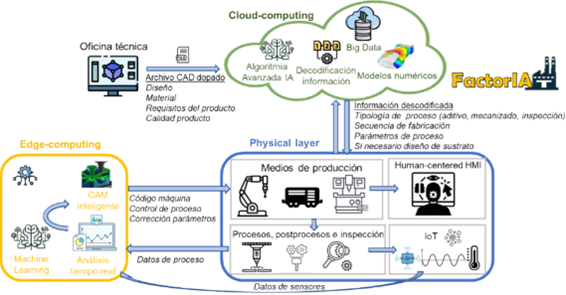
Last Tuesday, February 18, 2025, the launch of the FactorIA Project took place in Derio: “Research and Development of AI technologies to provide maximum autonomy to manufacturing and repair using DED processes for large, high-value-added parts.” The event was held at the facilities of the research organization TECNALIA RESEARCH & INNOVATION, located in the Science and Technology Park of Bizkaia.

The project, file number MIG-20242026, is subsidized by the CDTI through the2024 call for the “SCIENCE AND INNOVATION MISSIONS – TRANSMISSIONS” Program, within the framework of the State Plan for Scientific and Technical Research and Innovation. It is also supported by the Spanish Ministry of Science and Innovation. The 2024 Trans Misiones initiative is a joint action between the CDTI and the AEI, included in the PEICTI, coordinating funding for groups of research and knowledge dissemination organizations and business consortia working collaboratively on coordinated R&D actions to address the challenges identified in thematic priority areas (Missions).
The AEI consortium includes three universities (UNIVERSITY OF THE BASQUECOUNTRY, UNIVERSITY OF NAVARRA, PUBLIC UNIVERSITY OF NAVARRA) and one public research center (INSTITUTE OF PHYSICAL AND INFORMATION TECHNOLOGIES"LEONARDO TORRES QUEVEDO" (ITEFI), a CSIC research institute). All participants contribute complementary capabilities to tackle the challenges addressed by FactorIA.
The FactorIA project has a total budget of €6,867,956 from the CDTI group and a duration of 4 years, ending in late 2028.
FactorIA is led by the company TECSA, with participation from ASTILLEROSMURUETA, DGH ROBOTICS, IBARMIA, LEBARIO, INNERSPEC, KEYLAND, and SOTHIS, and with technical support from TECNALIA RESEARCH & INNOVATION.

- TECSA is mainly specialized in maintenance services for railway networks inSpain and is the company that has built and maintains the most kilometers ofthe high-speed rail network.
- ASTILLEROS MURUETA is a shipbuilder with experience in over 200 vessels,focusing on hydrodynamics, materials, and advanced electronics.
- DGH Group is an industrial engineering and maintenance company recognized asone of the top 10 robotics providers in Europe.
- IBARMIA specializes in machining centers and is a pioneer in adoptingadditive manufacturing DED technologies using lasers, as well as in developingthe "Digital Footprint" concept for machine tools to optimizemaintenance.
- LEBARIO focuses on manufacturing molds for high-pressure die casting (HPDC).
- INNERSPEC is a medium-sized company specialized in Non-Destructive Testing(NDT), having designed a complete inspection system for space shuttle boosterrockets and serving clients such as NASA, SPACEX, and AIRBUS.
- KEYLAND is a tech company focused on digitalization and automation forIndustry 4.0 using proprietary technology.
- SOTHIS provides integrated IT, business, and industrial management solutions,implementing cybersecurity, data analytics, and artificial intelligencetechniques.
The goal of the FactorIA project is to change the current manufacturing workflow from Technical Office–Operator–Production Means to a new paradigm: Technical Office–Production Means–Operator. In this new approach, production systems evolve to a conscious level, guiding operators only when their intervention is necessary.
FactorIA aligns with the mission of advancing secure IoT and edge computing and related deep technologies to enable autonomous factories. The project aims to investigate a wide range of technologies contributing to the development of“lights-out” autonomous manufacturing by applying state-of-the-art research inartificial intelligence, IoT, deep learning, digital twins, robotics, cybersecurity, cloud and edge computing, and metallic additive manufacturing via Directed Energy Deposition (DED), both laser-DED and arc-DED, adapting these technologies to future industrial contexts.
Among these enabling technologies, FactorIA will explore industrial software platforms, advanced AI algorithms, machine and deep learning, cloud and edge computing, wireless sensors, and enhanced communications and networks—all integrated under the concept of a DIGITAL THREAD to provide autonomy in manufacturing, joining, and repairing large, high-value parts using Metallic Additive Manufacturing (DED), as well as inspection and advanced machining 4.0 post-processes.

FactorIA's developments will exponentially boost the intelligent automation and digitalization of processes such as welding and DED-based additive manufacturing in Spanish industry. The research, development, and results of the project will also be applicable to other processes with similar challenges.
FactorIA will help address the goals of Spain 2050, including “Becoming moreproductive to grow better” and “Becoming a carbon-neutral, sustainable, andclimate-resilient society.”
In summary, the systems and processes developed and optimized in FactorIA willcombine advanced automation with technologies such as the Internet of Things(IoT), Edge Computing, Machine Learning, Advanced Algorithms for autonomousdecision-making systems, Cloud Computing, predictive functionalities,Cybersecurity, and other Industry 4.0 technologies like Machine Vision,Metallic Additive Manufacturing, DED, machining 4.0, hybrid physical-digitalmodels (digital twins), advanced control systems, continuous process monitoringsystems, and NDT inspection technologies. All of these will be integrated undera unified Digital Thread.
To achieve its goals and objectives, FactorIA proposes 5 areas of action:

